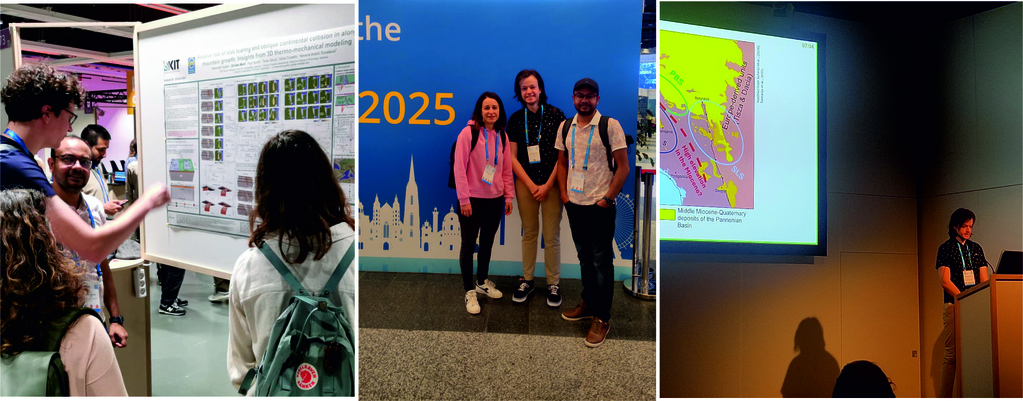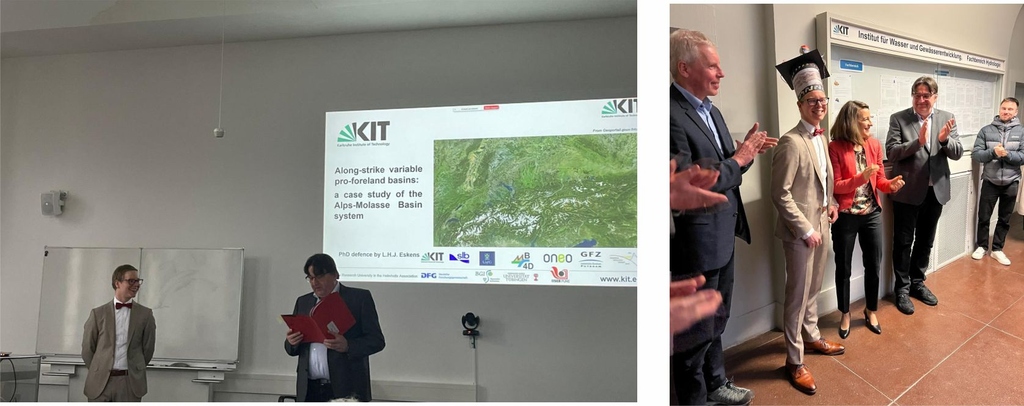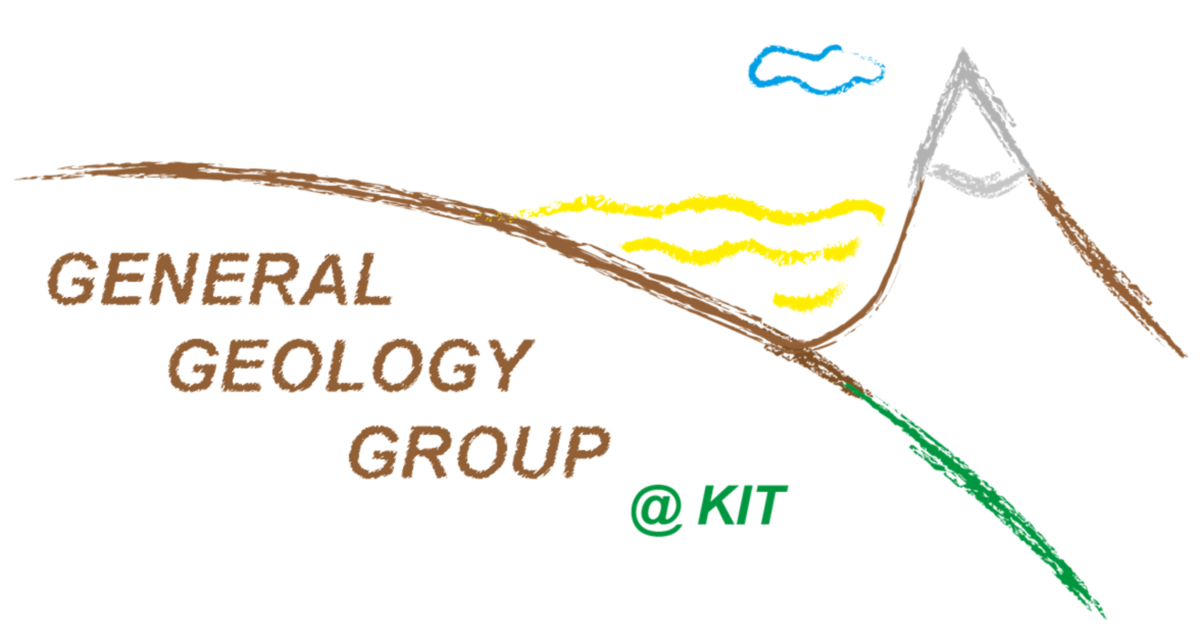About us
Research in the General Geology group, led by Tenure-Track Professor Nevena Andrić Tomašević, focuses on how tectonics, magmatism, climate and surface processes interact to influence sedimentary basins and their associate mountain ranges. In particular we are interested in:
- The influence of geodynamic processes on location, timing and rates of sediment accumulation.
- Source to sink relations in sedimentary basins associated with hydrothermal systems.
- Disentangling and quantifying tectonic and climatic controls on erosion, transport and deposition.
To investigate these topics, we use a range of tools and techniques including field observations, analytical measurements, basin analysis and numerical models.
Our research has broad implications on the sustainable use of sedimentary basins for underground resources like drinking water, raw materials and pore-space to produce and store energy.
For more information, check out our ongoing projects and open positions.
| Date | Time | Title | Speaker |
|---|---|---|---|
10/07/2025 |
16:00h |
Projekt “ WärmeWerk Wörth – Geothermal Exploration” | Robin Seithel |

We are pleased to announce that a new article entitled "Meteoric water δ18O across the Dinarides: Role of topography, air-mass mixing, and precipitation seasonality" is published from our group in Journal of Hydrology: Regional Studies.
This work is a collaboration between Nevena from General Geology group and G. S. Ortiz; J. K.C. Rugenstein (Colorado State University), M. Löberbauer; M. J. M. Meijers (Univ. of Graz), O. Mandic (Natural History Museum Vienna), D. Pavelić (University of Zagreb), V. Demir (Federal Institute for Geology - Sarajevo), and P. W. Keys (Boston University).
This study constrains the modern-day mechanisms that determine δ18O patterns in the Dinarides and indicates that orographically forced rainout is the dominant effect that modifies precipitation and surface water δ18O in the Dinarides region today.
Ortiz et al., 2026 (Journal of Hydrology: Regional Studies)
We are pleased to announce the publication of our latest article, “Orogenward Migration of the Flexural Forebulge: A Response to Increased (Sub)surface Loading in the Orogenic Core?”.
This study presents new insights into the tectonic forces that reshaped the Eastern Northern Alpine Foreland Basin during the early Miocene. By integrating seismic observations with flexural modeling, the research highlights the role of both surface and subsurface loads in driving forebulge migration.
The publication is the result of a collaborative effort by our group members Lucas, Giridas, and Nevena, and is now available online.
Eskens et al., 2025c (Terra Nova)

We are pleased to inform you that an article from the research group on "The Tectonostratigraphic Expression of Slab Breakoff in Foreland Basins: Insights From 2D Forward Stratigraphic Modeling" is now published and available online.
This work is a collaboration between Lucas, Nevena from our group and A. Piccolo (University of Leeds), M. Thielmann (University of Bonn), B. Claussmann (SLB Abingdon Technology Centre), M. Lejri (SLB Norway Technology Center), and T. A. Ehlers (University of Glasgow).
This research project combined geodynamic models with forward stratigraphic models to investigate the stratigraphic fingerprint of slab breakoff in a pro-foreland basin. It is shown that slab breakoff may be recognised in reflection seismic data. This project exemplifies the strength when universities and companies join forces.

We are pleased to inform you that an article led by Nevena on "Contributions of arid climate and hydrothermal fluid flowon sedimentation in saline-alkaline lakes: Insight from theIbar intramontane basin (Southern Serbia)" is now published and available online.
This work is a collaboration between Nevena from our group and Benjamin F. Walter (Univ. Tübingen), Vladimir Simić (University of Belgrade), Mohsin Raza (KIT), Dragana Životić (University of Belgrade), Željana Novković (MMI Bor Mining and Metallurgy, Bor,Serbia), Jochen Kolb (KIT), Axel Gerdes and Aratz Beranoaguirre (Goethe- Universität Frankfurt)
This study highlights the importance of the tectonics of the collisional orogens and associated processes, arid climate and basin hydro-logical regime on the deposition of B, Ca- rich deposits in saline-alkaline lakes.

Nevena, Giridas, Robert attended the EGU General Assembly conference in Vienna from 27th April to 3rd May 2025.
Nevena co-hosted a session on tectonics" TS2.7 Alpine-Mediterranean Tectonics: Subduction, Continental Collision, Magmatism and Volcanism" and presented a poster on " The role of the arid climate and hydrothermal fluids in depositional processes in saline alkaline lakes: inferences from Ibar intramountain basin (Serbia)"
Giridas presented two posters on his postdoc work: 1 ) "Slow Propagation of Slab Tearing at Collisional Boundaries: Implications for Foreland Basin Evolution and Adjacent Mountain Uplift" and 2) "Relative role of slab tearing and oblique continental collision in along-strike mountain growth: Insights from 3D thermo-mechanical modeling"
Robert presented an oral presentation on his PhD work on " Depositional evolution of the Valjevo-Mionica Basin (Internal Dinarides, Serbia) revealed through U-Pb zircon dating: correlation with regional tectonics and Miocene climate change "
EGU General Assembly 2025TT. Prof. Dr. Nevena Tomašević, head of the General Geology Research Group at KIT, has been featured as a role model for women in science. Her journey highlights the challenges of balancing career and family, a barrier many #Frauen (women) face in #Wissenschaft (science).
To promote #Chancengleichheit (equal opportunity), KIT’s tenure-track professorship offers predictable, transparent career paths for young scientists. Dr. Tomašević is paving the way on this path, inspiring others to pursue leadership in STEM.
Learn more here
Nevena Inspires Women in Science Leadership
Lucas Eskens successfully defended his PhD thesis on 12.02.2025 and is now Dr. Eskens. Congratualtions! Lucas's PhD thesis focused on the "Along-strike variable pro-foreland basins: a case study of the Alps-Molasse Basin system".
PhD Defense of Lucas Eskens
We are pleased to announce that a new article entitled "Spatiotemporal Growth of Seismic-Scale Syn-FlexuralNormal Faults in the German Molasse Basin" is published from our group in journal Basin Research.
This work is a collaboration between Lucas and Nevena from our group and A. Kumar (GFZ Potsdam), M. Scheck-Wenderoth (GFZ Potsdam).

We are pleased to let you know that our article Topography Response to Horizontal Slab Tearing and Oblique Continental Collision: Insights From 3D Thermomechanical Modeling (doi:10.1029/2024JB029385) is now available online.
This work is a collaboration between Giridas, Paul and Nevena from our group and A. Koptev (GFZ Potsdam), T. Gerya (ETH Zurich), and S. Crosetto (GFZ Potsdam).

Robert attended the GeoSaxonia 2024 conference in Dresden in September 2024 to present (poster session) his PhD work Reconstructing the evolution of the Miocene Sinj Basin through U-Pb zircon geochronology (Dinarides Lake System, Croatia)
This work is a collaboration between Robert and Nevena from our group, O. Mandic (Natural History Museum Vienna), K. Mužek (Croatian Geological Survey), A. Zeh (AGW, KIT) and D. Pavelić (University of Zagreb).
_rdax_1024x366_98.png)
We are pleased to let you know that our article Mineralogy, chemistry, and distribution of selected trace elements in coal and shale from the Ibar Basin (South Serbia) (doi:10.2298/TSCI240405143N) is now available online.
This work is a collaboration between Nevena from our group and Z. Novković (MMI Bor), M. Suárez (Univ. Salamanca), E. García-Romero (Univ. Madrid, IGEO), N. Nikolić, V. Gajić, V. Simić and D. Životić (Univ. of Belgrade).


